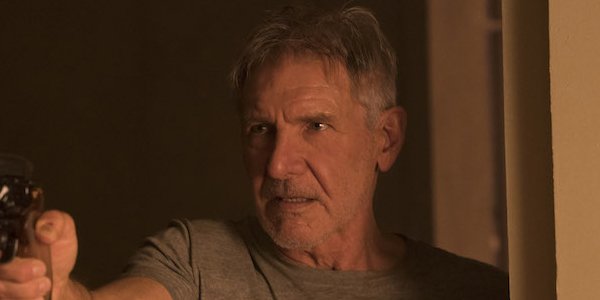How Blade Runner 2049 Decided To Handle The Big Rick Deckard Question

SPOILER WARNING: The following article contains spoilers for Denis Villeneuve's Blade Runner 2049. If you have not yet seen the film, and don't wish to know any details before you do, please bookmark this page and return after your screening!
Ridley Scott's Blade Runner is famous for many things, but near the top of that list is the ambiguity surrounding the nature of Harrison Ford's Rick Deckard. While different cuts of the movie offer different clues, one of the most persistent cinematic mysteries of the last half century has been the question of whether Deckard is a human or a replicant. Naturally, it's a debate that's addressed in the newly released sequel, Denis Villeneuve's Blade Runner 2049, but if you walked out of the theaters still not 100 percent sure about the issue, then that means you fully got it. Screenwriter Michael Green recently told me,
If we stuck the landing on this film, it is all about allowing continued debate on that question, other questions in the film, and on new questions asked in this film...With any luck you walk about wondering new things about different characters realness or subjective realness... It was thematic; it was required.
Last month, screenwriters Michael Green and Hampton Fancher were paired together for interviews during the Los Angeles press day for Blade Runner 2049, and I had the pleasure of sitting down with the two men for a conversation about the new movie. The subject of Rick Deckard came up when Green made an off-handing comment about "building" the character in the script, but I followed up by asking how they ultimately decided to take care of the elephant in the room.
As noted by Michael Green, the question of whether or not Rick Deckard is a replicant is built directly into the larger themes of Blade Runner. Specifically, if you really can't tell the difference, then does it actually matter? Both Ridley Scott's original and Blade Runner 2049 deal with philosophical issues threaded around our complicated yet simple definition of humanity, and keeping things open ended is an important part of the storytelling.
For his part, discussing the big question surrounding Rick Deckard and the themes of both Blade Runner and Blade Runner 2049 (having scripted both), Hampton Fancher added,
We're in conflict with ourselves all the time about it - about our own humanity and our selfishness, and so the morality of that is up for grabs always. And every story is about that if it's a serious story.
Frankly, though, Michael Green summed it up best, concluding the subject by saying,
Rick Deckard for me is Schrodinger's Cop. He must be both, and both must be true.
Thanks to Blade Runner 2049, we can expect the mystery of Rick Deckard to continue to persist for the foreseeable future -- but that's only a good thing, given the way it allows us to engage with such heady material. Now that the film is in theaters nationwide, we're thrilled to be peeling back layers and analyzing the movie, so stay tuned on the site for more of our editorial and interview coverage!
Your Daily Blend of Entertainment News

Eric Eisenberg is the Assistant Managing Editor at CinemaBlend. After graduating Boston University and earning a bachelor’s degree in journalism, he took a part-time job as a staff writer for CinemaBlend, and after six months was offered the opportunity to move to Los Angeles and take on a newly created West Coast Editor position. Over a decade later, he's continuing to advance his interests and expertise. In addition to conducting filmmaker interviews and contributing to the news and feature content of the site, Eric also oversees the Movie Reviews section, writes the the weekend box office report (published Sundays), and is the site's resident Stephen King expert. He has two King-related columns.
